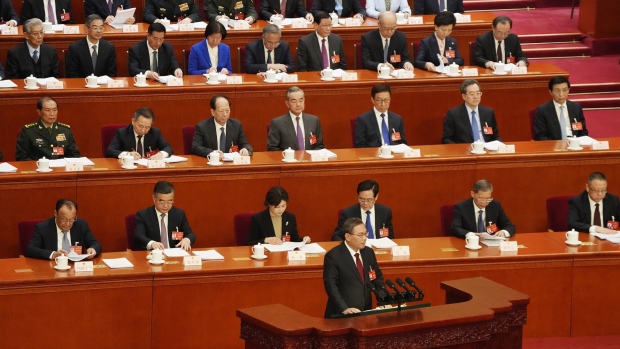Mar 4, 2024
China Says It Will Defuse Financial Risks at Its Top Legislative Meeting
, Bloomberg News

(Bloomberg) -- China pledged to deepen measures to address financial risks and “hidden dangers” at its annual legislative meeting, as policymakers seek to grow the economy with “greater security.”
Top officials aim to defuse risks in the property sector, local government debt, and small and medium-sized financial institutions by “addressing both symptoms and root causes,” Premier Li Qiang said in a government work report released Tuesday at the National People’s Congress meeting. They will also improve coordination to ensure parties ranging from enterprises to government departments fulfill their responsibilities in cutting risks.
Beijing made tackling these issues a key task at the Central Financial Work Conference in late October. The policy goal has become more urgent this year as China struggles to meet its economic targets amid prolonged deflation and to stabilize its stock market after three years of losses.
The government has stepped up regulatory oversight across the board. The National Financial Regulatory Administration has reiterated that it will boost efforts to crack down on illegal financial activities and dispose of bad loans, while the China Securities Regulatory Commission has moved to quash computer-driven investment strategies that some have blamed for exacerbating market turmoil.
Beijing is also ramping up stimulus for the economy, as it unveiled an around 5% growth target at the meeting. China plans to issue 1 trillion yuan ($139 billion) of ultra-long special central government bonds this year, the fourth such sale in the past 26 years.
The nation’s lenders, which have been called on to cut risks from indebted developers and local governments, are expected to play a more prominent role in defusing the “time bombs,” according to Bloomberg Intelligence.
Banks may need to eventually provide more than 1 trillion yuan ($139 billion) to property projects that qualify for funding support, analyst Francis Chan wrote in a recent report. They might also heed Beijing’s call to roll over local government financing vehicle debt at lower rates. The big four banks’ LGFV exposure totals about 6.2 trillion yuan, Chan estimated.
China will also refine its property policies and meet justified financing demands of developers regardless of their ownership type, Premier Li said.
National service duties squeezed bank margins to a record low of 1.69% at the end of last year, below the 1.8% threshold that’s regarded as necessary to maintain profitability. China has moved to guide banks’ deposit rates lower and trim their reserve requirements, although that hasn’t yet alleviated the pressure.
Bloomberg Intelligence expects margins at lenders to narrow further this year by more than 10 basis points on average, with asset quality also worsening.
--With assistance from Emma Dong.
©2024 Bloomberg L.P.





